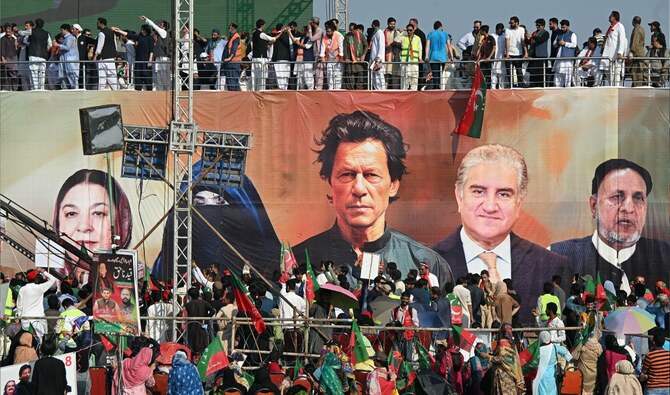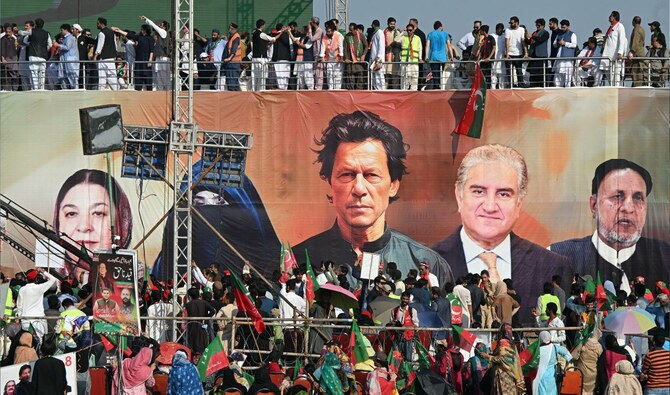ISLAMABAD: Jailed former prime minister Imran Khan’s party on Sunday held a large public rally in Islamabad and called for his release from prison within two weeks, as authorities said “several” policemen were injured after Khan supporters pelted them with stones.
Khan, who has been in jail since August last year, faces a slew of charges and was convicted in four cases since he was first taken into custody, all of which have been either suspended or overturned by the courts. Khan remains in jail, however, on new charges brought by Pakistan’s national accountability watchdog regarding the illegal sale of gifts from a state repository while he was prime minister from 2018 till 2022.
The rally by Khan’s Pakistan Tehreek-e-Insaf (PTI) comes after it was postponed twice before. The gathering was previously planned for July and then August but was called off both times after permission was revoked over what officials described as security threats and concerns about unrest.
“If Imran Khan is not released within two weeks, then we ourselves will have him released,” close Khan ally, Ali Amin Gandapur, chief minister of the Khyber Pakhtunkhwa province, told a charged crowd in Islamabad’s Sangjani area. “Are you ready to get your [right]? I will lead you. Do not fall back.”
Gandapur announced the party would hold its next rally in Pakistan’s political heart of Lahore, saying authorities would “forget about Bangladesh,” referring to recent protests in the South Asian nation that saw autocrat Sheikh Hasina ousted from power after 15 years.
This was the first rally held by the PTI since the Feb. 8 national elections and was met by authorities in Islamabad blocking dozens of main roads and key intersections to “ensure public safety” during the gathering.
Khan supporters and the police clashed at at least one location in the twin cities of Islamabad and Rawalpindi, where police and the interior ministry said several cops were injured after they were pelted with stones “without provocation” by Khan supporters. Khan’s party in turn alleged law enforcers were “shelling and attacking attendees for no reason.”
The PTI says the main aim of the rally was to mobilize supporters for the release of Khan who has waged an unprecedented campaign of defiance against Pakistan’s powerful military and blamed the then army leadership of orchestrating his ouster in a parliamentary no-trust vote in April 2022. The army says it does not interfere in political affairs.
Khan also faces the prospect of a military trial for treason and attempting to incite a mutiny in the army following the recent unprecedented arrest of former Pakistani spy chief Lt. Gen. Faiz Hameed.
Khan’s key ally Gandapur told participants of the Islamabad rally that nobody would be able to hold a military trial of the jailed premier, distancing his party from Gen Hameed who is accused of violating the Pakistan Army Act.
“Fix your institution, fix your generals, fix yourself,” Gandapur said, in a direct reference to the army.
Information Minister Ataullah Tarar said the PTI had failed to gather a large number of people and was sharing “fake” visuals to demonstrate its strength among the public.
“The millions of people who had to come out [for the PTI rally] in the form of an ocean are not to be seen. Yes, a rally was held as per usual like other rallies, as should happen, it’s a democratic right, and should be held in the time allotted by district administration,” he told the media in a video statement.
“But I fail to understand that to hide the failure of their rally they are tweeting [fake] visuals. Footage from other countries are being run.”
Independent analysts said the PTI had managed to put on a decent show.
“Strong turnout for PTI rally despite the state’s tactics to limit numbers through roadblocks and containers, and despite the risk of violent crackdowns and arrests,” tweeted Michael Kugelman, South Asia Institute Director at the Wilson Center in Washington.
“Its size and popularity ensure its mobilization capabilities remain intact despite relentless attempts to curb it.”
The PTI says it has faced a months-long crackdown since protesters linked to the party attacked and damaged government and military installations on May 9, 2023, after Khan’s brief arrest that day in a land graft case. Hundreds of PTI followers and leaders were arrested following the riots and many remain behind bars as they await trial. The military has also initiated army court trials of at least 103 people accused of involvement in the violence.
The party says it was not allowed to campaign freely ahead of the Feb. 9 general election, a vote marred by a mobile Internet shutdown on election day and unusually delayed results, leading to accusations that it was rigged and drawing concern from rights groups and foreign governments.
The PTI says it won the most seats but its mandate was “stolen” by PM Sharif’s coalition government which formed the government with the backing of the all-powerful military. Both deny the claim.


















